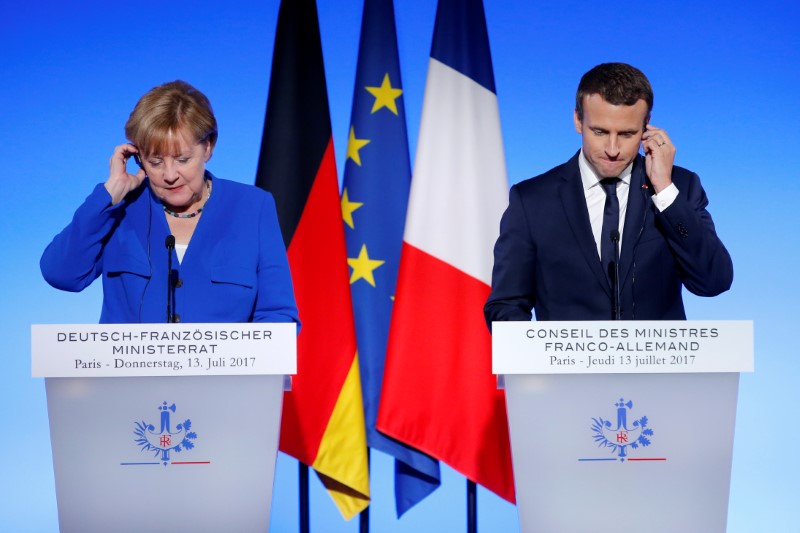BERLIN (Reuters) - Acknowledging deep divisions between Berlin and Paris over European reform, leading German and French economists have urged both capitals to shift their stances, warning that a face-saving "small bargain" would not make the euro area more stable.
The call reflects concern among economists in both countries that French President Emmanuel Macron and German Chancellor Angela Merkel could struggle to clinch what is often referred to as a "grand bargain" on Europe after a decade of political and economic crisis.
It comes a day after Macron sketched out his vision for a sweeping reform of the European Union in a speech in Paris and three days after Merkel won a fourth term as chancellor, but was forced to pursue coalition talks with a party that is critical of Macron's ideas.
"If both sides stick to their current positions, the outcome of the incipient Franco-German push for euro area reform is predictable – and depressing in that it would not solve any of the key challenges," the economists said in an article published in Germany's Frankfurter Allgemeine Zeitung on Wednesday morning and to appear later in France's Le Monde.
The authors include Jean Pisani-Ferry, the architect of Macron's economic program, Henrik Enderlein of the Hertie School of Governance, Clemens Fuest of the Ifo Institute, and Marcel Fratzscher, head of the Berlin-based DIW institute.
The economists said rising interest rates, vulnerable banks and ineffective euro zone tools to promote good policies had left the bloc fragile despite an encouraging economic recovery in the 19-nation single currency zone.
They urged Germany to accept more risk sharing and France more market discipline. Without such movement, they said the likely result would be symbolic steps like a tiny euro zone budget, a finance minister without real powers and a cosmetic upgrading of the euro zone's bailout fund, the ESM.
"Apart from allowing both the French and German governments to claim victory at home, such a 'small bargain' would accomplish very little," the authors said.
A lowest common denominator approach, they argued, would set the stage for more fights between member states and Brussels and lead to a false sense of security across the currency bloc, hindering reforms.
The economists urged Berlin and Paris to broaden their discussion beyond fiscal policy, saying the focus on a euro zone budget was problematic. In a nod to German doubts about his idea for a budget, Macron focused his speech more broadly to include cooperation on defense and migration.

"French and German officials will need to take a leap of faith away from their traditional positions," the authors said.